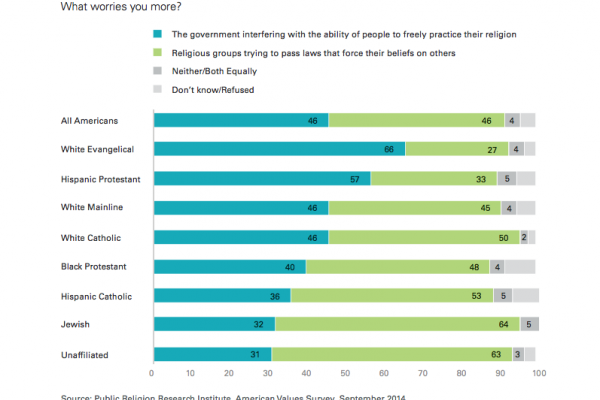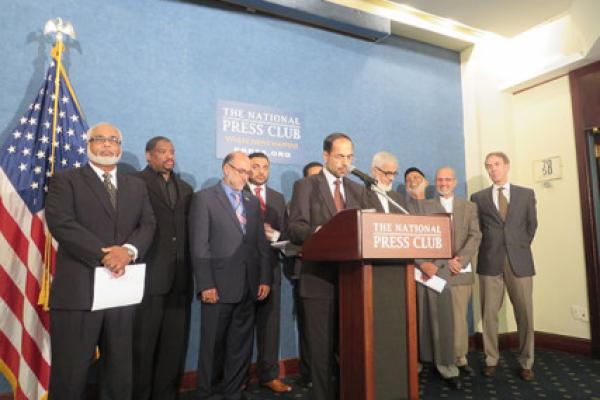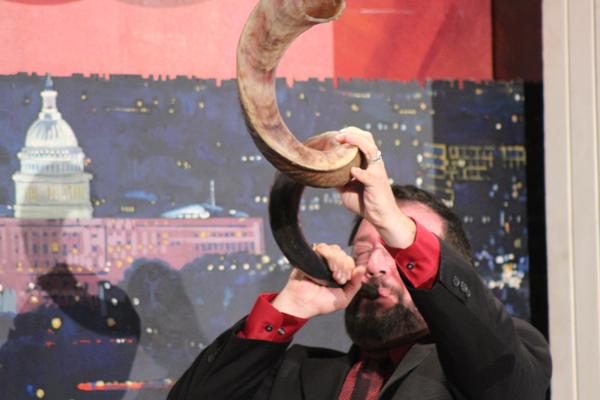Christ-followers are given another angle of vision, another mirror into our souls, in the person of Jesus Christ. No passage of Scripture points more acutely to this image than one of this week’s lectionary texts: Philippians 2:1-13. The Apostle Paul invokes the Christ hymn as a means of reminding us who we are called to be. He urges his readers to “be of the same mind” and to “have the same love” as the one who’s image they bear. Put simply, Jesus-followers are called to participate in a selfless, humbling, even self-emptying mode of being in the world.
How then ought Christ-followers respond to the religiously-inspired violence perpetrated by groups like ISIS/ISIL? I believe that Christ-followers, while denouncing all forms of violence—especially religious violence—ought to respond with compassion and sympathy.
We are able to move toward compassion and sympathy when we are able to articulate religious violence according to broader historical, geopolitical, and theological modes of analysis. What we require is something beyond bland appeals to ethical imperatives or capitulation to the rhetoric and presuppositions of religious extremists. We need a way to traverse the gulf that separates demonization from compassion, hatred from love.
My thinking about religious violence is sharpened by the work of my friend and mentor Ted A. Smith. In his forthcoming book, Weird John Brown: Divine Violence and the Limits of Ethics (Stanford University Press), Smith articulates a moral vision fueled by practical reason beyond that which is captured within an “immanent frame of causes and effects.” Smith writes explicitly to the concept of divine violence, which is a type of violence that claims some kind of immediate relation to that which is counted as holy, sacred, or ultimate. In light of Smith’s astute analyses, and following the model established by Christ Jesus, we may call Christians to a particular kind of understanding in the face of religious violence.
A Hymn for This Sunday
This hymn by Carolyn Winfrey Gillette asks the question what does it mean to be a Christian, a church? Whom do we serve? How shall we respond to those in need? It is based on the lectionary passage Matthew 21:23-32 (September 28, 2014). The United Methodist Worship Office has formatted the hymn with the music as a free download.
Once a Father Told His Children
NETTLETON 8.7.8.7 D (“Come, Thou Fount of Every Blessing”)
Once a father told his children,
“Go and do your daily chores.
Go and work out in my vineyard;
All that’s mine will soon be yours.”
One responded, “I won’t do it!”
Then he changed his mind and went.
One said, “Yes! Just send me to it!”
But he went back home again.
...
We all know that the world is moving down a very dangerous path, and that we must reverse our direction. But so far, the credible and persuasive scientific case hasn’t accomplished that. Sensible economic proposals haven’t halted that direction either. And smart political arguments have yet to reverse our course either.
Why? Because we are addicted to fossil fuels. The results are planet-threatening climate change and people-threatening terrorism.
We need conversion. Nothing less. Only our conversion could change our dangerous direction.
Two fundamental things could bring the kind of conversion we need.
One, our faith.
Two, our children.
I write this essay on the eve of a US led air campaign that marks “the biggest direct military intervention in Syria since the crisis began more than three years ago.” There is no denying that ISIS/ISIL has captured the attention of the world through its religiously inspired acts of violence. The atrocities committed in recent months by ISIS/ISIL have left countless people of faith—including many devout Muslim leaders across the world—speechless.
Yet, one of the central aspects of religiously inspired violence is that it rails against silence. Whether it is Christian violence in Nigeria and Uganda, Hindu violence in Western India, Jewish violence in Gaza, or Islamic violence in Indonesia and Syria, acts of terror demand denunciation. The ubiquity of religiously inspired violence across cultures and religious traditions lends credibility to the belief of some that religion itself is the problem. My own Christian tradition treats our inclination to harm and even kill one another as symptomatic of our fallen natures; it is a mark of our propensity to evil. This is what makes religious violence so pernicious: it twists our one remedy so that it exacerbates the disease.
Violence—whether it arises out of a Quentin Tarantino film or a YouTube video of decapitation—captures our attention. Even as we are repulsed by the scope of human depravity, such acts of violence consume our attention. Scenes of violence are like a mirror into the darkest parts of our soul: we cannot bear the images we see, but neither can we turn away.
More important than the celebrities or politicians marching on Sunday, members of the faith community came out in droves to support the rally. The Huffington Post reported on the wide variety of faiths that were represented at the march. A reporter from Christianity Today wrote, “Almost every conceivable strand of society was represented in the huge column of humanity — not only were there groups of Methodists and Baptists rubbing shoulders with Catholics and Presbyterians, there were Christians marching with Muslims, Jews, pagans, atheists and Baha'i. Anti-capitalist protesters stood alongside 'Concerned Moms for the Climate;' doctors, firemen, and vegans held banners next to indigenous people and victims of Hurricane Katrina.”
The reasons that thousands of individuals came out to the streets of New York City on Sunday are vast and personal. But for many members of the faith community, spreading awareness about the decaying state of God’s creation was a moral obligation. Signs such as “Jesus Would Drive a Prius” and a life-size moving Arkrepresented the importance of taking care of God’s creation throughout the rally. In a recent interview with the National Catholic Reporter, Steffano Montano, a theology professor at Barry University in Miami, said as a Catholic, there's a spiritual responsibility to combat climate change.
"By understanding creation, we can come closer to the Creator. It's an added spiritual responsibility. Justice for the earth is something that affects everybody. It's going to affect my daughter, my grandkids. It affects the poor in ways we are still trying to come to terms with. And it's our fault. So that's why we're here. It's on us to make a difference," said Montano.
The Southern Baptist Convention’s Executive Committee voted unanimously Sept. 23 to break ties with New Heart Community Church in La Mirada, Calif., after determining it was condoning “homosexual behavior.”
“We believe that, following the lead of Pastor Danny Cortez, New Heart Community Church has walked away from the Southern Baptist Convention’s core biblical values,” said Roger Oldham, a spokesman for the committee.
Oldham said Cortez attended the meeting and indicated that he had officiated at a same-sex wedding.
The denomination has cut ties to churches that endorsed homosexuality before, but this may be the first time that its Executive Committee has withdrawn fellowship from a church on behalf of the denomination. The move came less than two weeks after the California Southern Baptist Convention’s Executive Board voted unanimously to withdraw fellowship from the congregation because of Cortez’s announcement that he affirmed gays — including his teenage son — and his church had taken a “third way” on homosexuality.
When it comes to concerns over religious liberty, Americans are divided as to which is in more imminent danger: the ability to practice one’s religion without government inference, or the consequences to freedom of others enforcing their own religious beliefs on others. According to the 2014 American Values Survey, released Tuesday from the Public Religion Research Institute, nearly half of Americans (46 percent) say they are more concerned about religious groups trying to pass laws that force their beliefs on others. An equal number (46) say they are more concerned about the government interfering with the ability of people to freely practice their religion.
More than 120 Muslim scholars from around the world joined an open letter to the “fighters and followers” of the Islamic State, denouncing them as un-Islamic by using the most Islamic of terms.
Relying heavily on the Quran, the 18-page letter released Sept. 24 picks apart the extremist ideology of the militants who have left a wake of brutal death and destruction in their bid to establish a transnational Islamic state in Iraq and Syria.
Even translated into English, the letter will still sound alien to most Americans, said Nihad Awad, executive director of the Council of American-Islamic Relations, who released it in Washington with 10 other American Muslim religious and civil rights leaders.
“The letter is written in Arabic. It is using heavy classical religious texts and classical religious scholars that ISIS has used to mobilize young people to join its forces,” said Awad, using one of the acronyms for the group. “This letter is not meant for a liberal audience.”
Even mainstream Muslims, he said, may find it difficult to understand.
A new coalition of atheists, humanists and other nonreligious groups is taking a page from the gay rights movement and encouraging people to admit they are “openly secular.”
The coalition — unprecedented in its scope — is broadening a trend of reaching out to religious people and religious groups by making the secular label a catchall for people who are not religious.
“We wanted to rise above who is an atheist, who is an agnostic, who is a humanist, who is a secular Jew,” said Todd Stiefel, founder of the Stiefel Freethought Foundation and a main force behind the coalition. “This needed to be about something everyone could rally behind so we intentionally used the word secular because it was one thing we could all agree on.”
The campaign, “Openly Secular: Opening Minds, Changing Hearts,” was unveiled at the 65th annual gathering of the Religion Newswriters Association here on Sept. 20. It includes a website, resources for families, employers and clergy, and a YouTube channel featuring both prominent and rank-and-file nonbelievers announcing their names followed by the declaration, “I am openly secular.”
Happy 5775! At sundown on Sept. 24, Jews around the world will turn the page on the Jewish calendar to begin the new year, Rosh Hashanah. What starts with a feast at home will end 10 days later with a fast in the synagogue on Yom Kippur, the Day of Atonement. This time is referred to as “The Days of Awe” as Jews move between repentance and forgiveness, reflection and renewal.
Here’s everything goyim need to know about the High Holy Days so they can holler “L’shanah tovah!” — or “Happy New Year!” — without looking like a shmendrick.
Q: What do Jews celebrate on Rosh Hashanah and Yom Kippur?
A: The new year is celebrated with family and friends, but Jews are also expected to think about the meaning and direction of their lives. How could they have been better Jews? Better human beings? That comes full circle on Yom Kippur, when Jews fast for a whole day and reflect on their faults and the ways they have wronged people throughout the year. It is a holiday for making amends, for seeking and giving forgiveness.
Q: Well, ain’t that a party? Sign me up. KIDDING!








